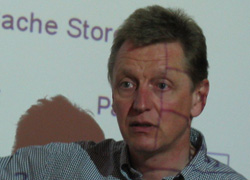IMDEA Networks

CacheCast: Eliminating Redundant Link Traffic for Single Source Multiple Destination Transfers

Prof. Dr. Thomas Plagemann, University of Oslo (Noruega)
External Presentation (External Speaker)
Abstract:
His talk consists out of two parts. The first part will give an overview on the current research activities and achievements of the Distributed Multimedia Systems Research Group at the University of Oslo. This includes video streaming in MANETs and disruptive environments, publish subscribe for sparse MANETs, deviation detection with complex event processing for automated home care systems, and clean-slate Future Internet research work. The second part will focus on CacheCast, which is joint work with Lancaster University and has been initiated in the Content NoE. Due to the lack of multicast services in the Internet, applications based on single source multiple destinations transfers such as video conferencing, IP radio, IPTV must use unicast or application layer multicast. This in turn has several well-known drawbacks. A basic insight is that this type of traffic exhibits high redundancy with temporal clustering of duplicated packets. The redundancy originates from multiple transfers of the same data chunk over the same link. We propose CacheCast – a link layer caching mechanism – that eliminates the redundant data transmissions using small caches on links. CacheCast’s underlaying principles are simplicity and reliability. It is a fully distributed and incrementally deployable architecture. It consists of small caches on links that act independently. A single cache removes redundant data from a packet on the link entry and recovers the data on the link exit. Thus, link caches are transparent to routers. We show through analysis and simulation that CacheCast achieves near multicast efficiency for superposition of unicast connections. We implemented CacheCast in ns-2 and show that it does not violate the current understanding of “fairness” in the Internet. However, this is achieved only with appropriate server support. To evaluate the costs of server support, we have designed and implemented a new system call for CacheCast support. The system call separates all CacheCast concerns from an application with a simple and easy to understand API. Evaluation results show a negligible overhead of the system call when compared to the standard send call. Our modified streaming server is able to handle an order of magnitude more clients than the original server in a bandwidth constrained environment.
Who is Thomas Plagemann?
Thomas Plagemann is Professor at the University of Oslo since 1996. Currently, he leads the research group in Distributed Multimedia Systems at the Department of Informatics. He has a Dr.SC degree from Swiss Federal Institute of Technology (ETH) in 1994 and received in 1995 the Medal of the ETH Zurich for his excellent Dr.Scient thesis. His research interests include multimedia systems, protocols architectures for the Future Internet, networked sensors and event based systems, and mobile systems. He has published over 100 papers in peer reviewed journals, conferences and workshops in his field. He serves as Associate Editor for ACM Transactions of Multimedia Computing, Communications and Applications and as Editor-in-Chief for the Springer Multimedia Systems Journal. He has successfully given tutorials at IDMS 1999, ACM Multimedia 2001, PROMS 2001, DAIS 2002, MIPS 2004, ConTel 2005, and ACM Multimedia 2009.

La conferencia se impartirá en inglés

